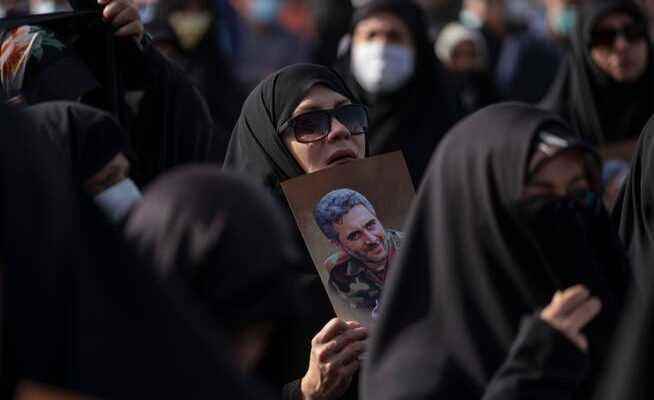In recent months, there have been numerous unsolved assassination attempts on regime representatives and researchers in Iran. Israel’s Prime Minister Naftali Bennett has now announced that there has been a change of course towards Iran.
Funeral service for the murdered Revolutionary Guard Colonel Sayad Khodaie on May 24 in southern Tehran.
Several Iranians who belonged to the powerful Revolutionary Guards or did military research have died under mysterious circumstances in the past two months. Earlier this week, Iranian state media reported the “martyrdom” of two officers involved in the Revolutionary Guard’s aviation program. One is said to have died in a car accident near a major weapons depot southwest of Tehran, and the other died in an area east of the capital where a missile testing facility is located.
The authorities had already announced the death of two scientists at the beginning of June: Ayub Entezari, an engineer, worked at the aviation center in Yazd, more than 600 kilometers south-east of Tehran. Kamran Aghamolaei was a geologist who worked at least part of the time at a military research center. Both developed symptoms of food poisoning after a dinner – Aghamolaei in Tehran, Entezari in Yazd – and died shortly thereafter. Since the other guests did not fall ill, the authorities assume targeted murders.
Targeted by the Mossad
Regime officials, however, remain silent about the details. In the case of Entezari, the authorities also downplayed the role of the scientist. After the governor initially honored Entezari as a “martyr” who had died in the service of the country, it was said a little later that he was merely an employee of a private company. The government also did not comment on the accidental death of an engineer in a research department of the Parchin military facility near Tehran at the end of May or on the fatal fall of a member of the Revolutionary Guard from a residential building in Karaj.
The series opened with the assassination of Sayad Khodaie, a colonel in the Kuds Forces, the Revolutionary Guard’s overseas arm. Khodaie was shot dead by gunmen on a motorcycle in front of his home in Tehran on May 22. It is not only in Iran and in the region that the Israeli foreign intelligence service Mossad is suspected to be behind the deaths. Even in the Israeli media, anonymous security officials are quoted as suggesting that Israel is responsible for them. In the case of Khodaie, Israel is said to have officially confirmed the assassination attempt to the American government, as reported by the New York Times.
Iran and Israel have long engaged in a shadow war. The leadership in Tehran, which repeatedly calls for the annihilation of Israel, supports Hezbollah in Lebanon and Palestinian extremists. Israel, in turn, is attacking Iranian arms depots, supply routes and even oil tankers in Syria, and is bombing pro-Iranian militia positions in the Iraqi-Syrian border area. In Iran itself, Israel has been held primarily responsible for attacks on nuclear facilities and the murder of nuclear researchers.
Everywhere and everytime
Recently, however, Israeli Prime Minister Naftali Bennett has repeatedly stated that he wants to change course and implement the so-called octopus doctrine. This aims to hit not only the nuclear program, but also Iran’s military program and Tehran’s regional strategy. There was a turning point in Israel’s strategy last year, Bennett told a parliamentary committee in early June.
Unlike in the past, Israel attacked “the head of the terrorist octopus and not just its arms”. Gone are the days when Iran could use its regional allies to attack Israel and get away with it unscathed. “We strike anywhere, anytime, and we will continue to do so,” Bennett said. The pithy tones are well received in Israel.
However, it is questionable whether the procedure will bring more security to the country. First of all, it increases tensions in the region. Under the new doctrine, Israel is said to have attacked an air force base in western Iran in mid-February, destroying hundreds of Iranian drones in the process. The Iranians claimed the drone strike near Kermanshah came from Iraqi Kurdish territory and fired ballistic missiles at a building near Erbil.
Warnings before traveling to Turkey
The murder of Khodaie was meant to be a warning to the Iranians to stop their attacks on foreigners around the world. He is said to have been behind plans to kidnap and murder Israelis and other nationals. Initially, however, the murder seems to have increased the risk of attacks on Israeli tourists. The government issued a travel warning for Turkey on Monday because of the acute risk of attacks by Iranian agents.
Israelis should immediately leave Turkey, especially Istanbul, and cancel all trips there, it said. In dramatic words, the National Security Council reiterated the warning on Thursday. ‘Always lock the hotel door. Do not accept invitations from strangers. Do not post your travel plans on social media »are some of the warnings. Without giving details, the media reported that several attack plans had been thwarted in the past two weeks.
